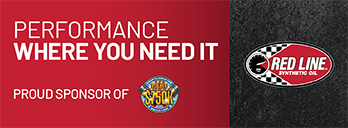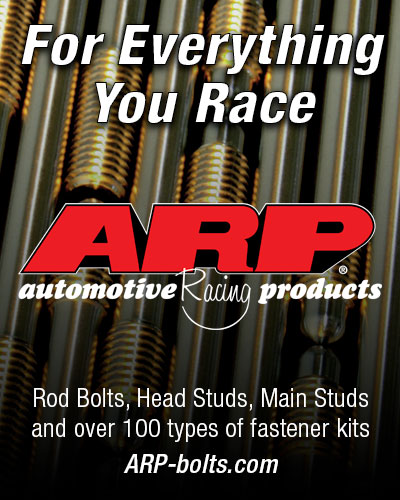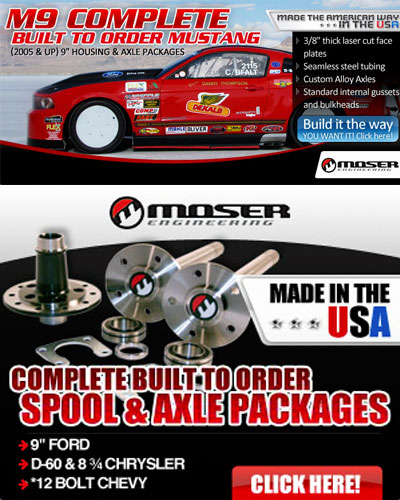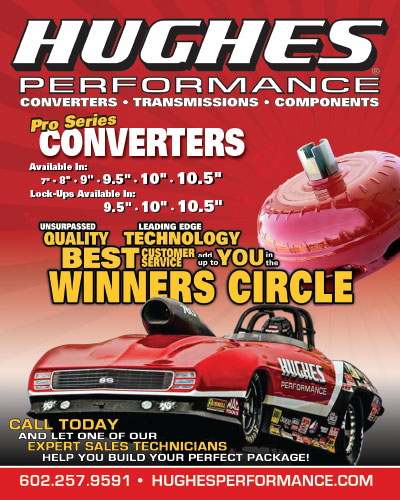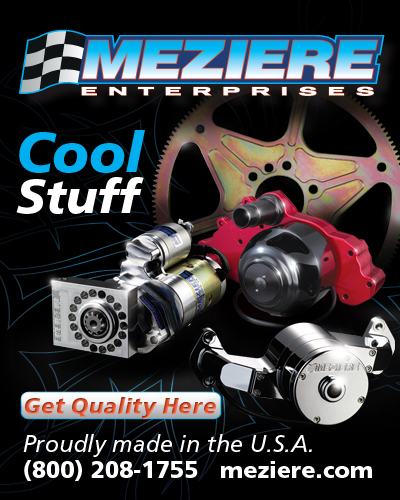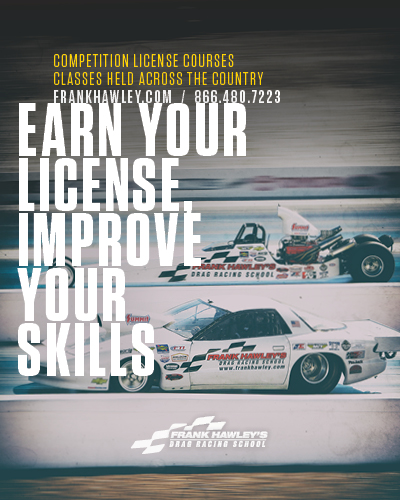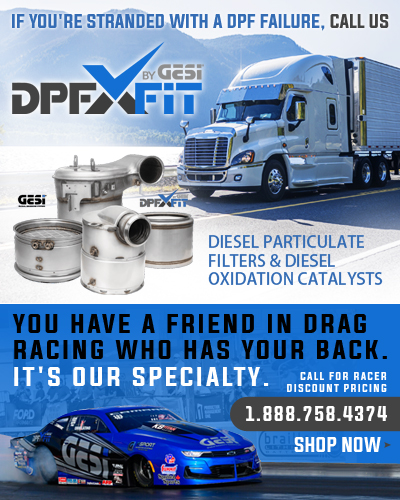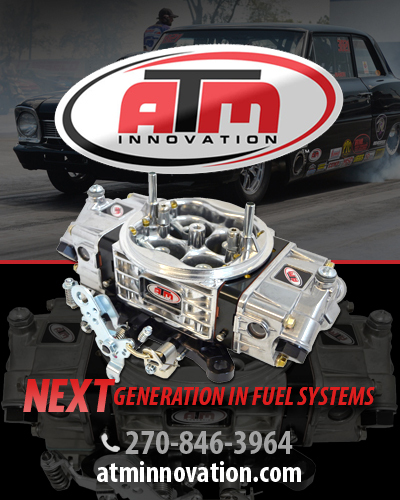AL BILLES REFLECTS, ANALYZES
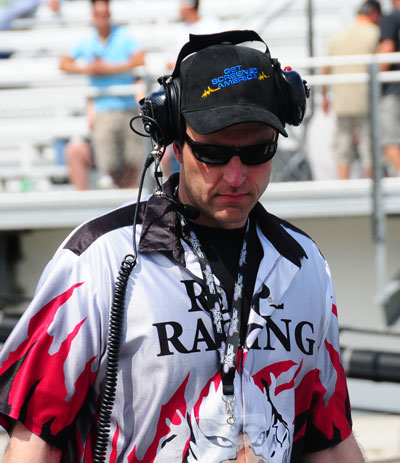 IHRA's
Top Sportsman, progressing into a feared competitor in Pro Modified and
evolving into one of the most sought-after tuners in the class, the
Canadian national is a force to be reckoned with.
IHRA's
Top Sportsman, progressing into a feared competitor in Pro Modified and
evolving into one of the most sought-after tuners in the class, the
Canadian national is a force to be reckoned with.Until suffering back-to-back crashes in 2005, Billes spent his time behind the wheel of a Pro Mod and an alcohol Funny Car. He was a powerhouse in IHRA competition and moved to NHRA Pro Mod Challenge events in 2004, where he won three out of ten events and the shootout. In '05, he ran a handful of races before he crashed his '53 Corvette and suffered a concussion during a match race at Lancaster Raceway Park near Buffalo, NY.
For almost 20 years, the name 'Al Billes' has been synonymous with innovation in drag racing. Starting in the nitrous ranks in  IHRA's Top Sportsman, progressing into a feared competitor in Pro Modified and evolving into one of the most sought-after tuners in the class, the Canadian national is a force to be reckoned with.
IHRA's Top Sportsman, progressing into a feared competitor in Pro Modified and evolving into one of the most sought-after tuners in the class, the Canadian national is a force to be reckoned with.
Until suffering back-to-back crashes in 2005, Billes spent his time behind the wheel of a Pro Mod and an alcohol Funny Car. He was a powerhouse in IHRA competition and moved to NHRA Pro Mod Challenge events in 2004, where he won three out of ten events and the shootout. In '05, he ran a handful of races before he crashed his '53 Corvette and suffered a concussion during a match race at Lancaster Raceway Park near Buffalo, NY.
Just two weeks later, he was back behind the wheel, clocking the fastest IHRA Pro Mod pass in the history of Milan Dragway at 231.08 mph during the Dukes of Hazard Motor City Nationals, but in the blink of an eye, his life - and career - changed. After his monster run, he said the parachutes failed to open and the car careened off the track and began bouncing through to the sand trap. The front wheel caught the sand and the car barrel-rolled to a stop. Although he was able to climb out of the wreckage under his own power, Billes suffered a condition called "post-concussive syndrome" and was sidelined from driving.
Now, four years later, Billes has rebuilt his career as a tuner and has weighed in on several key issues facing the class today.
CP: You were a part of the founding of the whole Pro Mod class, when nitrous was king. Although you've since jumped to supercharged power plants, how have you seen the nitrous cars change?
AB: They are quite technical now, state of the art. They have some high-end electronics in them, and they are very complex. The guys that run them well, they are a bunch a sharp guys. They have done so much since I started way back when. It used to be so simple, but as everything evolves, it becomes more complex, and they are very complex racecars.
For me, I like the supercharged cars - that's just my preference. I was probably better in the nitrous cars for a long time, and it took me a while to become halfway decent in a super charged car - there's a fairly big learning curve there.
Today, I think doing your own nitrous program would be harder than running a supercharged program. Those things are really fussy, it seems they'll burn pistons up really easily and they are just not as forgiving. The nitrous guys have spent a lot of time and money in development, and they have those things apart quite a bit. I believe you could hurt a lot of parts quickly and not go fast at all if you don't know what you're doing.
CP: So, you've had to make the move from driving to tuning - do you think it helps you, having been behind the wheel?
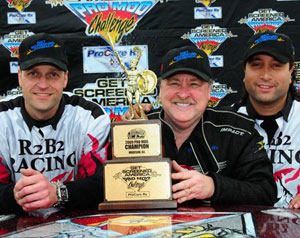
AB: I definitely think so because I can talk with the drivers and make sense of what they are saying. I made a LOT of runs behind the wheel, not just a few. The amount of runs I made - 125-175 runs a year for over 15 years, that's a lot of runs and that helps a lot in understanding what the driver feels, what they are doing, how they are doing it. It's been a big asset, for sure. I didn't set out to be a tuner, it's not what I intended, it's just where I ended up.
CP: You said you wanted to win a Pro Mod championship, and now, since you're not driving, how will that happen?
AB: Well, I think we did that with Kenny Lang. I suppose it's as close as that's going to get. Being a tuner and winning has to be fine for me. I'm not going to drive any time soon, the head trauma I got was pretty nasty, so for the moment, I'm not going to drive.
I could drive again, and the doctors have cleared me, but I couldn't take another impact. So, it has to be fine. I consider any win in any car I'm working on as my win. The guys have to buy me a trophy - that's the deal - and I've got them all lined up at home, too.
CP: So, you don't have any plans to drive any time soon -
AB: Not by choice - it was just the luck of the draw. You have to realize, though, that a crash in 2005 is much different than a crash today in 2009. It would have been for me, anyway. Today, the cars have better driver protection equipment - largely, I believe as a result of what happened to Eric Medlen and Dale Earnhardt. The safety technology is better all around.
Think about it: seatbelts have better hip restraints and we're not letting drivers slide around, we have poured in seats. Neck restraints are mandatory and even the parachutes are understood a lot better with the aerodynamics there. We're after all the safety stuff a lot more diligently; all that stuff would have paid big dividends for me.
CP: So, based on your experience, how does a body recover?
AB: It depends. The nuts and bolts, broken bones and stuff, that will all heal, but you may still hurt a bit. When it rains it hurts - things like that. That's not going to stop anyone, though, from waterskiing, snow skiing, riding horses, driving a race car, anything - that's just what we accept if we're the type of personality that likes to do that sport. You'll be sore. Period.
The biggest thing, from my experience, is the head and neck trauma. That's what doesn't heal well. We know that form other sports, too - you get a hockey player, a football player, etc., who gets hit repeatedly, and you get post-concussive syndrome. That's a hard thing to overcome, and athletes often have to retire because of it.
For me, within two weeks of my first crash, I had a second crash. They call that second-impact syndrome, and my brain hadn't fully healed from the first one and that's significantly worse than if the incidents were a month and a half or two months apart. It was a bad deal for me, and I didn't fully understand what was going on inside my brain.
They told me I had a concussion, and I thought "well, what's that mean?" I went to my doctor, and he didn't say much. If I'd had a neurologist explain what could happen to me, I'd never have gotten in that car that day, but it's all the learning that we've gone through since then. I didn't understand that back then - but now we can impart that knowledge on the other guys. After my second impact, I had a hard time. I went to the grocery store and couldn't make change for a dollar. You get pretty scrambled.
I'm about 70 percent now, and that's why I won't get back in. I've got kids now, too, and that wouldn't be fair to my wife or them.
CP: Since you've been tuning, have you seen things other than the cars improve? What about the tracks and facilities?
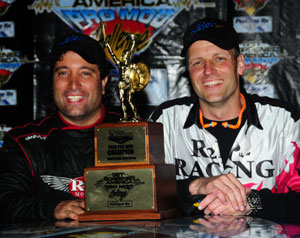
AB: The newer tracks are awesome - significantly better than they used to be. Look at the Bristol and Charlotte facilities for example. Though it's not new, the Englishtown track for us was one of the best track surfaces we've been on ever. Even compared to last year - it was better this year when we ran. Whatever the reason, track prep or whatever, it was phenomenal.
There's always going to be a variation in the facilities from track to track, but overall, we've seen a lot of great changes. There are a lot higher concrete walls and guard rails, and that makes things a lot safer. Actually, I wouldn't mind those soft walls like they use in NASCAR, but that's kind of expensive. I mean, come on - these Pro Mods seem to be crashing rather frequently. We need bumpers, crumple zones and air bags, right?
The facilities are better than they were for sure, and I wonder sometimes how much of the ET advancements are because of the advancements in the track preparation, better glues on the tracks, better tires. Everything evolves, and to try to pinpoint if there's any specific aspect in what's responsible for an improvement -it's hard to do that.
CP: With things getting quicker and quicker - do we need to change the rules to slow things down?
AB: Wow. That's a really tough question. Why would we do that? If you define constraints and limitations, you would take out all the creativity and fun out of it. The Pro Mod class has seen a number of crashes lately, and there are some safety aspects that should be looked into to ensure driver safety. Just like the Funny Cars of two years ago or the Top Fuel cars before that. The drivers, owners and chassis builders need to work together in training and developing new equipment to keep the drivers as safe as possible. I wouldn't want to see the class slow down or be mandated spec components. We just have to work through things and evolve naturally.
My job is to make these cars go as fast as I can - and I'd hate to see us go backwards.
Advertisement

